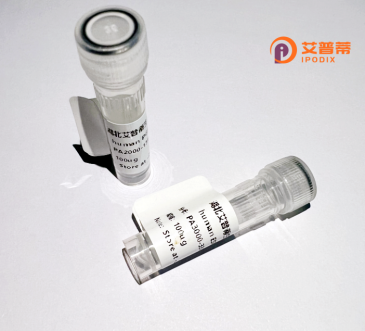
| 纯度 | >90%SDS-PAGE. |
| 种属 | Human |
| 靶点 | ALX4 |
| Uniprot No | Q9H161 |
| 内毒素 | < 0.01EU/μg |
| 表达宿主 | E.coli |
| 表达区间 | 1-411aa |
| 氨基酸序列 | MNAETCVSYC ESPAAAMDAY YSPVSQSREG SSPFRAFPGG DKFGTTFLSA AAKAQGFGDA KSRARYGAGQ QDLATPLESG AGARGSFNKF QPQPSTPQPQ PPPQPQPQQQ QPQPQPPAQP HLYLQRGACK TPPDGSLKLQ EGSSGHSAAL QVPCYAKESS LGEPELPPDS DTVGMDSSYL SVKEAGVKGP QDRASSDLPS PLEKADSESN KGKKRRNRTT FTSYQLEELE KVFQKTHYPD VYAREQLAMR TDLTEARVQV WFQNRRAKWR KRERFGQMQQ VRTHFSTAYE LPLLTRAENY AQIQNPSWLG NNGAASPVPA CVVPCDPVPA CMSPHAHPPG SGASSVTDFL SVSGAGSHVG QTHMGSLFGA ASLSPGLNGY ELNGEPDRKT SSIAALRMKA KEHSAAISWA T |
| 分子量 | 44 kDa |
| 蛋白标签 | His tag N-Terminus |
| 缓冲液 | 冻干粉 |
| 稳定性 & 储存条件 | Lyophilized protein should be stored at ≤ -20°C, stable for one year after receipt. Reconstituted protein solution can be stored at 2-8°C for 2-7 days. Aliquots of reconstituted samples are stable at ≤ -20°C for 3 months. |
| 复溶 | Always centrifuge tubes before opening.Do not mix by vortex or pipetting. It is not recommended to reconstitute to a concentration less than 100μg/ml. Dissolve the lyophilized protein in distilled water. Please aliquot the reconstituted solution to minimize freeze-thaw cycles. |
以下是关于ALX4的3篇代表性文献概览:
---
1. **文献名称**:Mutations in the human *ALX4* gene cause parietal foramina and craniofacial dysostosis
**作者**:Wu, Y. Q., et al.
**摘要**:研究发现ALX4杂合突变与人类颅骨畸形(顶骨孔未闭合)及额部多毛症相关,揭示了ALX4在颅面骨骼发育中的关键作用。
---
2. **文献名称**:The role of *Alx4* in the establishment of anteroposterior polarity during vertebrate limb development
**作者**:Qu, S., et al.
**摘要**:通过小鼠模型证明,ALX4通过调控Shh等信号通路参与肢体前后轴形成,缺失ALX4导致肢体发育异常,强调其在胚胎模式建立中的功能。
---
3. **文献名称**:ALX4 dysfunction disrupts craniofacial and epidermal development through impaired BMP signaling
**作者**:Holmberg, J., et al.
**摘要**:研究发现ALX4通过调节BMP通路影响颅神经嵴细胞分化和皮肤发育,实验显示ALX4缺失导致斑马鱼胚胎颅面部缺陷及表皮异常。
---
以上研究从基因突变关联疾病、胚胎发育调控机制及信号通路角度解析了ALX4的多重生物学功能。
ALX4 (aristaless-like homeobox 4) is a transcription factor belonging to the ALX family of homeodomain proteins, which play pivotal roles in embryonic development and tissue patterning. Encoded by the ALX4 gene located on human chromosome 11p11.2. this protein contains a conserved DNA-binding homeodomain that regulates target gene expression by interacting with specific promoter regions. ALX4 is critically involved in craniofacial morphogenesis, limb development, and hair follicle differentiation. It acts downstream of signaling pathways such as BMP (bone morphogenetic protein) and Wnt, modulating cellular proliferation and differentiation during organogenesis.
Mutations in ALX4 are associated with genetic disorders like parietal foramina type 2 (PFM2), characterized by skull defects, and frontonasal dysplasia, affecting facial structure. Additionally, ALX4 dysfunction has been linked to ectodermal abnormalities, including hereditary hypotrichosis. Beyond developmental contexts, ALX4 exhibits tissue-specific expression in adults, suggesting roles in homeostasis. Recent studies also implicate ALX4 in cancer progression, where its dysregulation correlates with tumor suppression or oncogenic effects depending on the tissue type.
Recombinant ALX4 proteins are utilized to study its structural properties, DNA-binding mechanisms, and interactions with co-regulators. These tools aid in exploring therapeutic avenues for ALX4-related disorders and deciphering its context-dependent regulatory networks in development and disease.
×